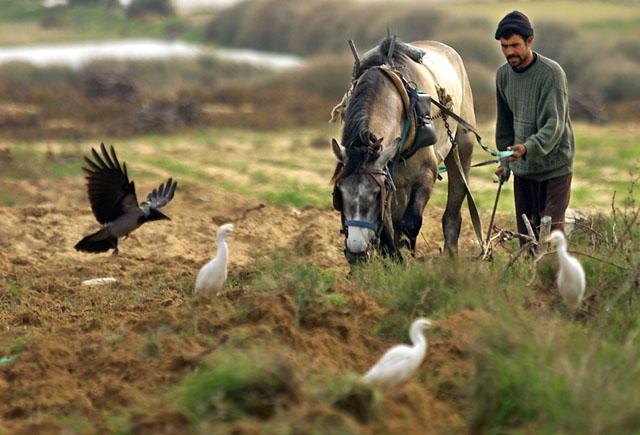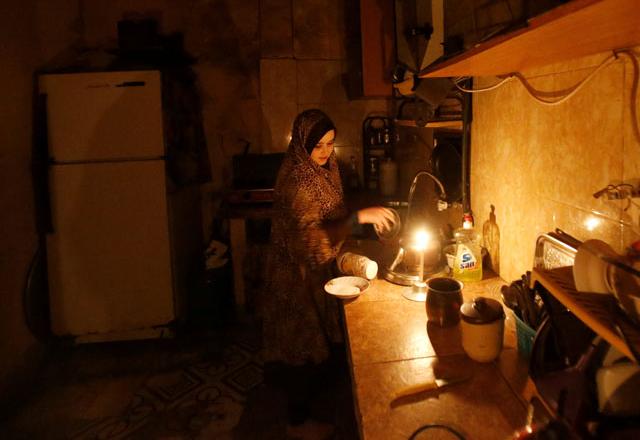You are here
Israel resuming some Gaza produce imports halted in 2007
By Agencies - Mar 05,2015 - Last updated at Mar 05,2015

TEL AVIV — Israel will start buying some fruit and vegetables from the Gaza Strip next week, a partial resumption of imports halted when the Islamist group Hamas took over the Palestinian territory in 2007, Israeli officials said on Thursday.
They said the measure was designed to help a Gaza economy devastated by last year's war with Israel, and to make up for a shortfall in produce from Israeli farmlands left fallow during the current Jewish lunar calendar year in accordance with biblical law.
The move was welcomed by Jamal Abu Al Naja, director of the Gaza Vegetable Production and Export Association, who xpressed hope it would help make up farmers losses and eventually encourage working farms to seek bank funding to expand their production.
Some Palestinian farmers stopped cultivating their fields altogether or sold their land to housing developers after Israeli markets were closed to them in 2007.
Israel, which has been facing international calls to ease its blockade of Gaza, has been gradually relaxing restrictions on commerce across its fortified border since the July-August war which caused widespread destruction in the enclave.
It has allowed Israeli transit of Gaza-produced vegetables and Palestinian merchants to the occupied West Bank, and for Gaza farmers to bring tractors in via Israel since November.
COGAT, the Israeli military agencies that oversees civilian interaction with Gaza, said a shipment of tomatoes and eggplants would be brought in from the territory on Sunday.
"Future stages are expected to include a wider variety of vegetables, totalling 1,000 to 1,500 tonnes. Each tonne is valued at approximately 3,000 shekels ($750)," COGAT indicated in a statement, noting that the imports were scheduled to run the duration of the Jewish calendar year that expires in September.
COGAT deals with civilian authorities but shuns Hamas.
"The steps taken are meant to support the Palestinian population while segregating the Hamas organisation, which is an entity that prevents the reconstruction of Gaza and uses its resources," COGAT head Major-General Yoav Mordechai said.
Abu Al Naja said Israeli authorities had already carried out quality tests on tomato, eggplant, cucumber and zucchini samples.
"If implemented, it will help farmers make up for their losses, increase the number of workers and encourage investment in the agricultural sector," he told Reuters.
Separately, the Hamas-run energy authority said Thursday that Gaza Strip's sole power plant has halted production, following a dispute with the West Bank-based Palestinian Authority (PA) over fuel tax.
Hamas pays the PA for fuel imported to besieged Gaza, but is short of cash and had been unable to cover the additional costs in tax.
In December, Qatar stepped in and donated $10 million (nine million euros) to the PA to cover the tax, effectively exempting Hamas from paying it.
But that money has dried up, and the PA is insisting Hamas begin paying the tax again, the Islamist movement says.
"The power plant stopped producing electricity during the night, after funds from Qatari donations to cover fuel costs ran out," the energy authority said. "We are unable to pay for the fuel because of the taxes on purchasing it."
Gaza is blockaded and controlled by Israel on two of its crossings, and isolated by Egyptian closure of a third.
Israel facilitates the entry of fuel supplies.
A crisis-hit Hamas is unable to pay its own government and security employees due to the blockade and Egypt's closure of the border, with financial restraints hurting the group.
The plant requires 550,000 litres of fuel per day to produce at capacity, the energy authority says.
Even with the plant running, Gaza suffers 12 hours of power outages each day, and that is expected to increase to 18 hours after the plant's shutdown.
Many individual homes have their own generators, and households can purchase, expensively, fuel that comes into Gaza for private consumption.
Hamas and the Palestine Liberation Organisation, which dominates the PA, signed a unity deal in April that was to see the West Bank-based government take over administration and security of the Gaza Strip.
But pending various disputes, including over the payment of Hamas's security forces, the deal has yet to be implemented, and Hamas remains in control of Gaza.
The two sides agreed on a government of independents in June, but progress on reconciliation to fix a years-old split was further delayed by Hamas's war with Israel in July and August.
Related Articles
RAMALLAH — An Israeli rights group warned on Thursday that cutting power to the Gaza Strip would have "catastrophic consequences" after Isra
Gaza farmers exported produce to Israel on Thursday for the first time since Israel imposed its blockade on the Palestinian territory in 2006, officials and an NGO said.
GAZA CITY — The Gaza Strip's sole power plant has halted production, the Hamas-run energy authority said Tuesday, in the latest dispute with

















